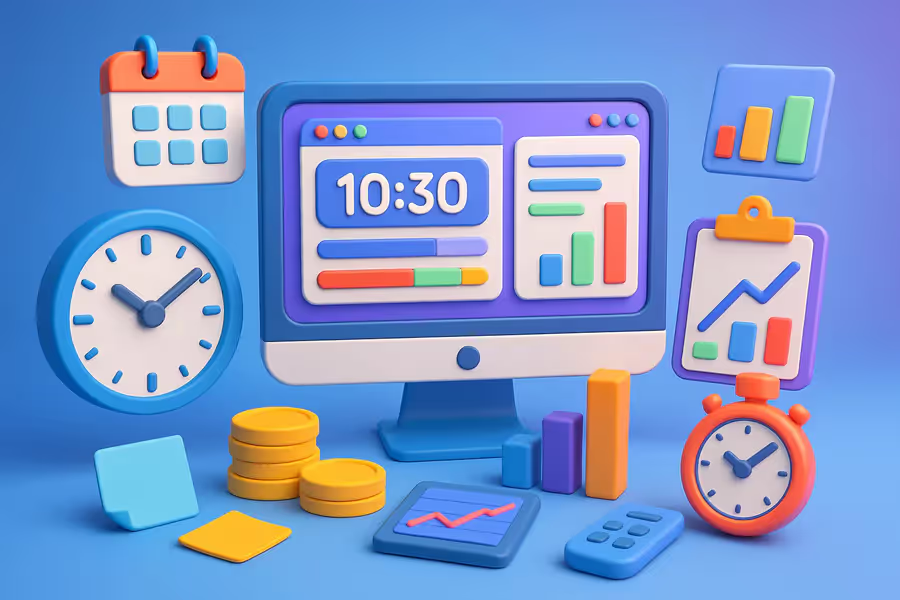What is working time tracking software?
Time tracking software is a tool used to track time spent on specific tasks at work.
When you're spending hours working on something, it can be difficult to determine how much time was spent on that specific project — especially if there are multiple people involved in certain tasks.
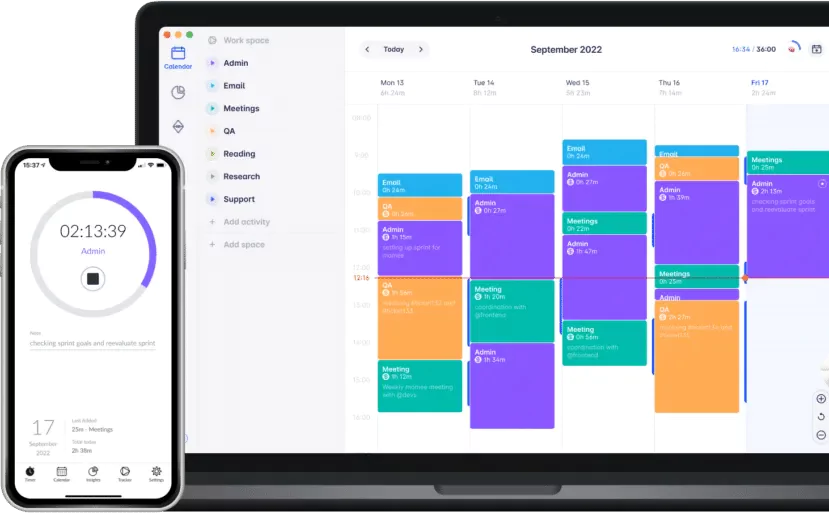
This can lead to differences of opinion about the progress of a task, or even arguments between colleagues about who should complete a group of tasks based on who started them or how much time is spent on these tasks.
That's where time tracking software comes in: employees will be able to accurately track their working hours and employers will be able to easily access this information to make important decisions.
Best time tracking software - Comparative guide & expert opinion
Managing time has never been so strategic: invoicing, payroll management, payroll management, remote working, project management... The right monitoring tools transform the productivity of any team. Discover the leading solutions: their advantages, limitations, and who they are really made for.
1. Clockify

Rate: Free (Pro starting at $4.99/month)
For whom: VSE/SMEs, freelancers, hybrid teams
Clockify is the reference for free time tracking tools. You can use it with an unlimited team, track absences, manage payroll, and get detailed reports without paying anything. Getting started is immediate, whether on web, mobile or desktop.
- Very complete free version
- Payroll export and detailed absence reports
- Multisite and unlimited users
To remember: Clockify remains the No. 1 choice for testing or structuring the time management of a small team without headaches. For advanced needs (validation, role management, advanced HR monitoring), switching to the Pro plan is necessary.
2. Toggl Track

Rate: Free (Premium starting at $9/month)
For whom: Freelancers, creators, agile project teams
Toggl Track focuses on simplicity and speed. Its automatic tracking detects your activities effortlessly. Project tags, dashboards, and integrations (Slack, Trello...) make them the ideal ally for creative professions and freelancers.
- Automatic tracking and smart suggestions
- Visual dashboards and tag analysis
- Multiple integrations, frictionless UX
Remember: If you are looking for a tool that doesn't take up your head and that saves you time on each project, Toggl Track is unavoidable. The advanced functions are still chargeable, but the core of the monitoring is available to everyone.
3 ClickUp
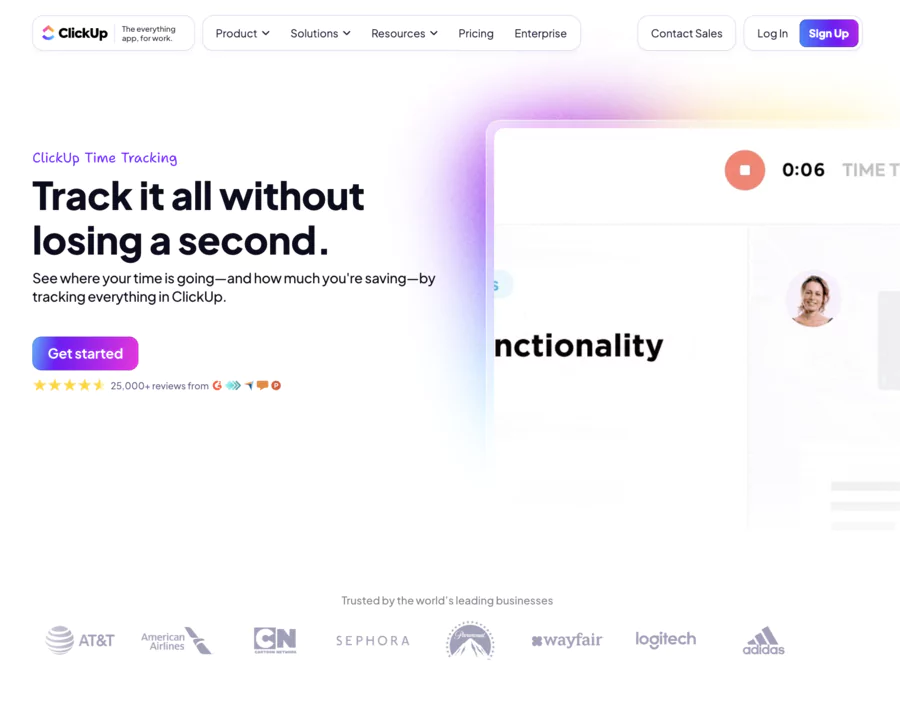
Tarif : Free (up to 100MB of storage), paid plans starting at $7/month
For whom : SMEs, startups, project teams, demanding freelancers
ClickUp has established itself as the “all-in-one” platform of the moment. It manages tasks, time tracking, documents, documents, chat, agendas, goals... without changing tools. Its time tracking is integrated: direct start/stop in each task, reports by member/project, exportable timesheets, multi-client management.
- Time tracking integrated into each task (web, mobile, desktop, Chrome)
- Automatic reminders and workload management
- Customized dashboards to visualize time, goals, and productivity
- Strong integration with Google Calendar, Slack, Zapier, Harvest, Toggl
To remember: ClickUp is ideal if you want to centralize time, task, and collaboration management without juggling multiple apps. Its dense interface requires a bit of adaptation at first, but its free version is already powerful. We also appreciate the depth of the integrations and the potential to manage both small projects and complex workflows. For teams that want to manage everything in one platform (and who are not afraid to dig into the settings), this is really a serious candidate.
4. TimeCamp
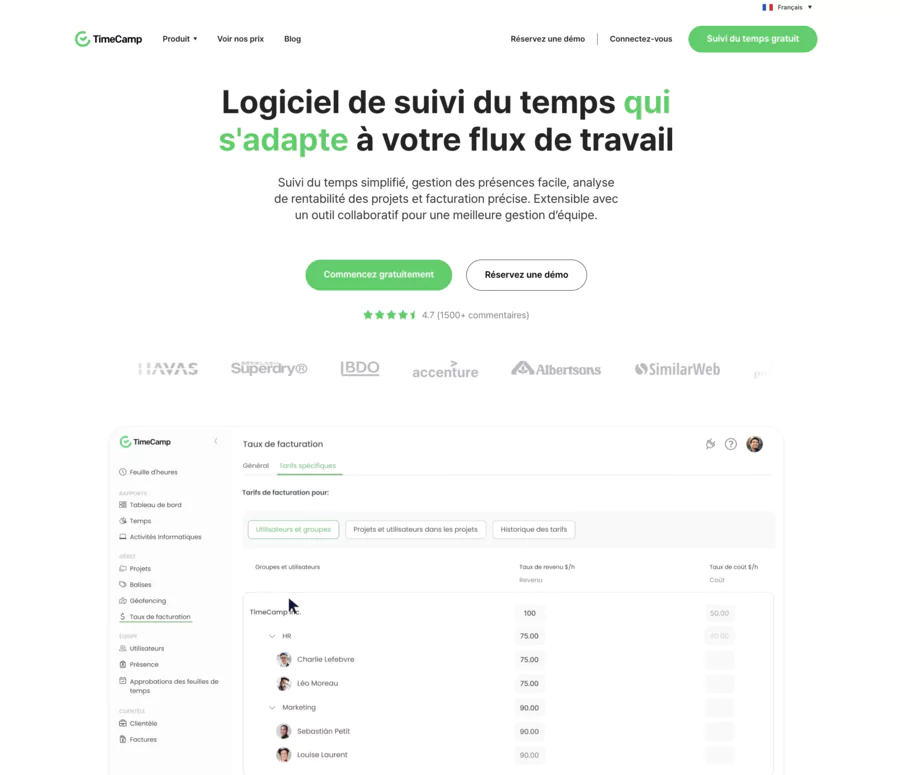
Rate: $14/month (14-day free trial)
For whom: SMEs, multi-sites, advanced HR management
TimeCamp excels at absence analysis, managing multiple sites, and customizing reports. Perfect for growing structures that want to professionalize HR management and cross-reference their activity data.
- Automatic analysis of absences and presences
- Multi-site monitoring, detailed exports
- API for ERP/HR integration
To remember: TimeCamp is designed for companies that want a very structured HR management. The prices vary according to the modules, so study the offer carefully before you commit yourself.
5. Harvest
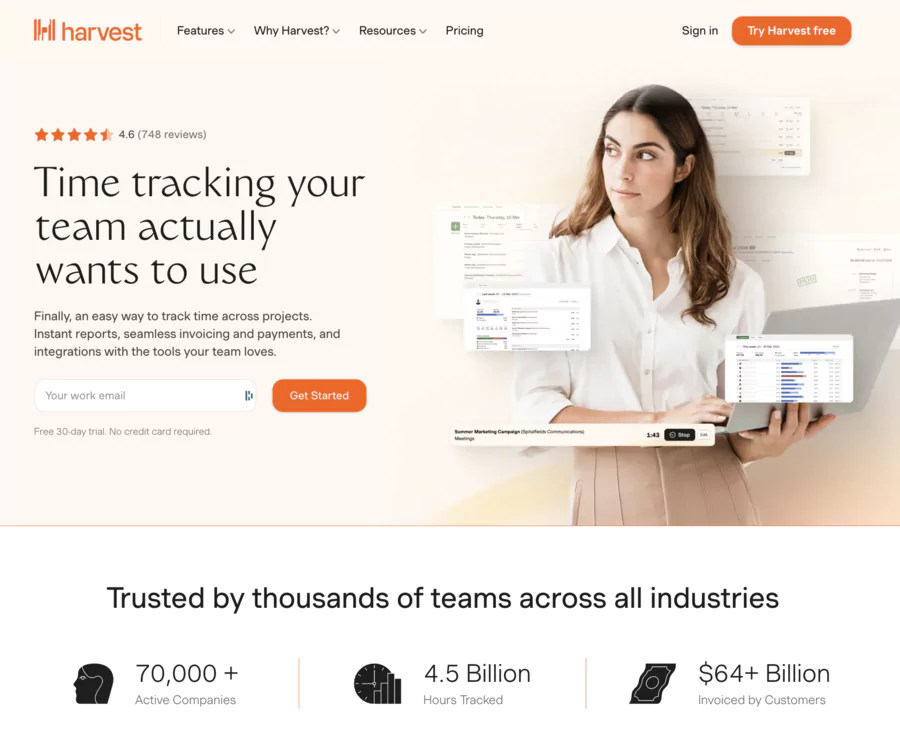
Rate: $15/month (30-day free trial)
For whom: Agencies, offices, teams that charge by the time
Harvest is the go-to solution for time spent billing. Everything is designed to make life easier for teams: leave management, payroll exports, overtime alerts, accounting integrations (Quickbooks, Xero).
- Billing time tracking
- Multi-client and multi-project management
- HR visibility and overrun alerts
To remember: Harvest simplifies the life of agencies and consultants. Ideal for those who want to automate invoicing based on time tracking without multiplying tools.
6. Hubstaff
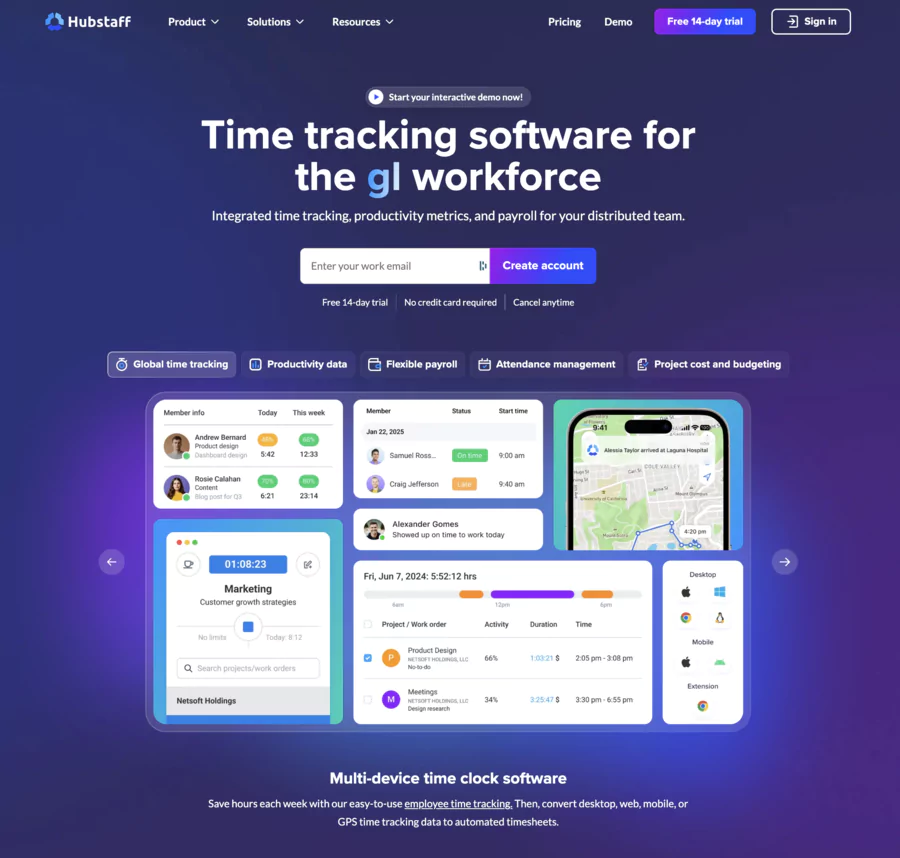
Rate: $14/month (14-day free trial)
For whom: Field teams, multi-sites, mobility
Hubstaff combines geolocation, compliance audit, and field schedule monitoring. It is popular in logistics, transport, or maintenance to monitor the productivity and mobility of teams.
- Real-time geolocation and activity tracking
- Time control, inactivity alerts
- Automated payroll and compliance reports
Key Takeaway: For businesses with dispersed or mobile teams, Hubstaff provides real HR traceability and facilitates travel management.
7. RescueTime
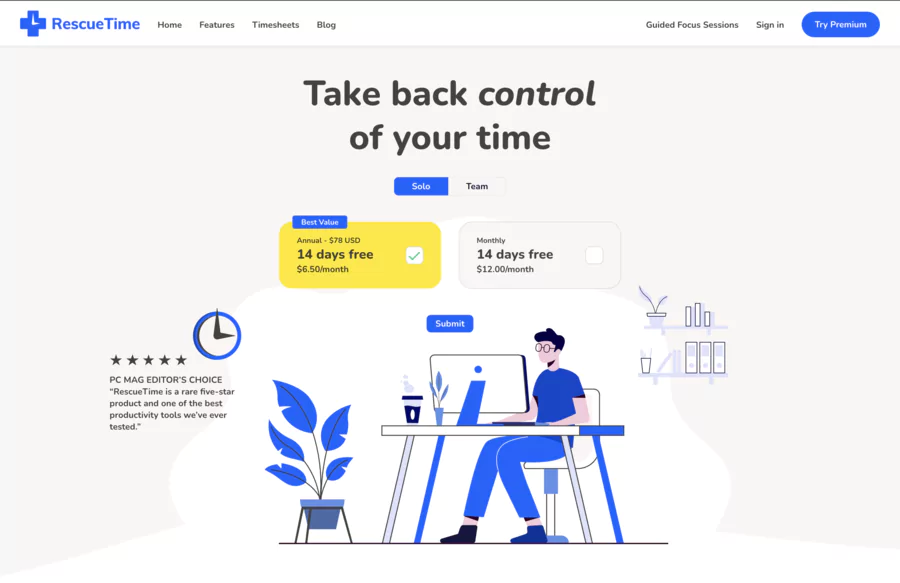
Rate: $12/month (Premium), limited free version
For whom: Individuals, freelancers, teleworkers
RescueTime automates the tracking of the time spent on each application, site or task. Its focus: to help each user identify their “time thieves” and to stay focused.
- Automatic productivity analysis
- Detailed reports, focus alerts
- Anti-procrastination features
What to remember: Ideal for those who want to understand (and correct) their productivity without imposing constraints on an entire team.
8. monday

Rate: $9/month (14-day free trial)
For whom: SMEs, growing teams, hybrid work
Monday.com is a real OS for team management: time tracking, HR planning, automation, collaborative portals... Its big advantage: centralize and automate everything without coding.
- Resource and work time planning
- Hybrid management (face-to-person/telework)
- Numerous integrations and visual boards
What to remember: For SMEs and HR managers who want to monitor both projects and time in the same interface, Monday is a scalable, intuitive solution that centralizes everything.
9. Time Doctor

Rate: $7 to $20/month (14-day free trial)
For whom: Hybrid teams, teleworking, HR management
Time Doctor takes time monitoring a step further with screenshots, inactivity alerts, and detailed analysis of each task. It promotes commitment and well-being by avoiding burn-out.
- Detailed tracking of time and applications used
- Engagement and alert tools
- Automated reports for managers
What to remember: To precisely monitor the productivity of a hybrid or remote team, while ensuring work/life balance, Time Doctor stands out as a reference.
10. Wrike

Rate: $9.80/month, free plan available
For whom: Project teams, IT services, advanced management
Wrike goes beyond simple time tracking: it integrates project management, activity tracking, and integrations with Slack, Teams, Google Drive. Ideal for multi-project teams who want a complete vision.
- Gantt charts, kanban views, and timelines
- Time tracking integrated into each project/task
- Advanced and customizable reporting
To remember: Wrike appeals to those who want a powerful tool, capable of managing time + tasks + projects with high level reporting.
11. Paymo
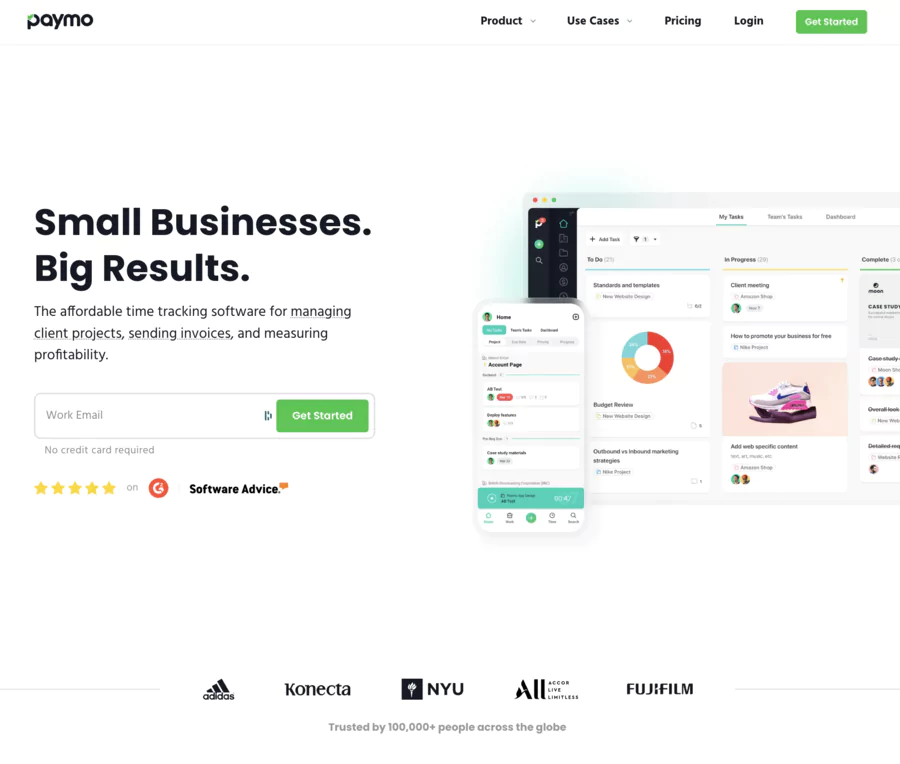
Rate: Starting at $9.95/month (15-day free trial, free plan possible)
For whom: VSEs, freelancers, agencies
Paymo centralizes time tracking, project management and invoicing in a single modern interface. We like its multiple views (Gantt, Kanban, calendar) and its desktop/mobile applications.
- Time tracking + tasks + billing
- Real-time reports, organization by project
- Customer management, notifications and alerts
What to remember: An ideal solution for structures that want a clear vision on all axes — without multiplying tools and without an explosive budget.

Expert advice: Always try the free trials to gauge usability. Focus on ease of use if your teams are not used to this type of tool. Check the HR/accounting exports and integrations. Finally, adapt the solution to your real needs: some tools are better suited to individual productivity, others to collaborative management.
Conclusion
All of the best time tracking apps are designed to work seamlessly with the other programs and services you already use in your business.
Time-tracking applications can provide detailed reports, analytics, and frequent update notifications for managers at all levels, while providing basic features such as user registration, project setup, and task assignment at no additional cost.
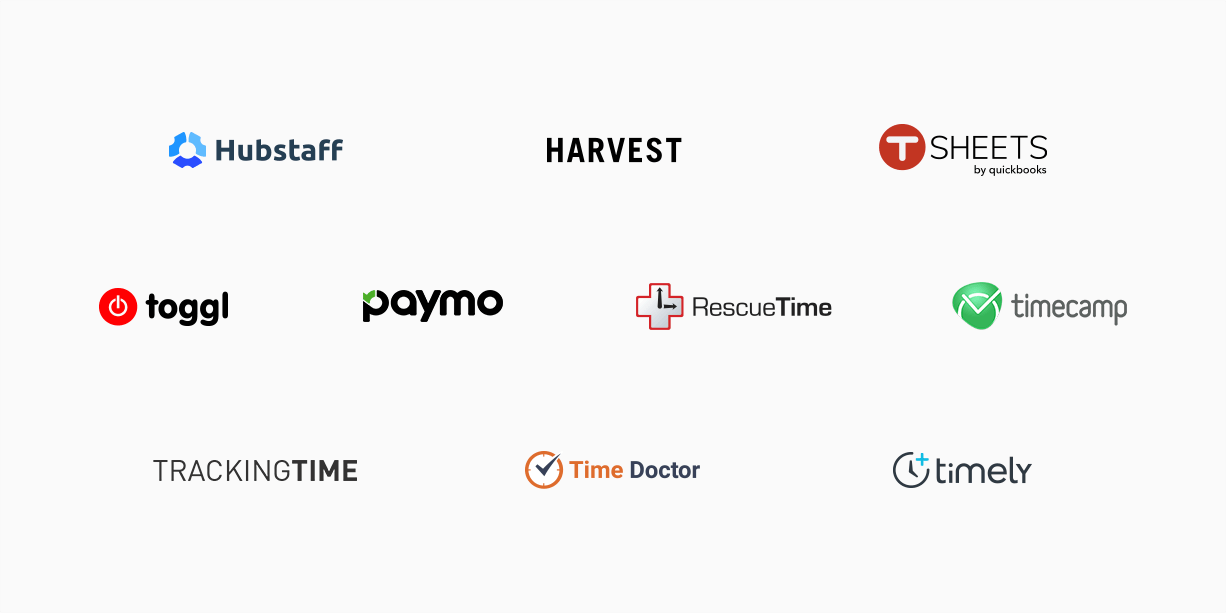
In short, the “best” tool depends in part on your context.
- Clockify and Toggl remain essential for small budgets.
- Harvest, TimeCamp, and Monday increase in power as soon as we talk about HR and billing.
- Wrike and Paymo are doing well in terms of project collaboration.
The important thing is to adopt a tool that makes daily life more fluid and gives real visibility to your team — and not the other way around.
Keeping the characteristics mentioned above in mind when choosing of an application With time tracking, you'll be able to choose the perfect software and start monitoring your team's work hours and productivity like never before.
FAQ
What is time management software for professionals?
Time management software helps professionals track the duration of each activity via a timer or time tracker. It offers dashboards to analyze performance, manage absences, and ensure compliance. Benefits: Fewer errors and better team presence (Gartner 2026: +20% productivity).
What are the best products for tracking working hours?
The list includes Clockify, Toggl Track, TimeCamp, each adapted to categories such as SMEs and SMEs. Clockify is free, TimeCamp excels for its multi-site dashboard. Choose according to your terms or use: freelancers (Toggl) or large teams (Hubstaff).
How does time management software differ from project tools?
GTA software tracks overtime and HR statements, not just tasks like Asana. It optimizes the schedule for each worker, with an operation focused on duration. Hybrids like Monday.com combine the two for all needs.
What are the advantages of time tracking software for my professional activity?
The use of software reduces the error rate by 40% (Gartner 2026), boosts performance via dashboards, and reduces costs. An SME with Hubstaff reduces overtime by 25%, freeing up time for the business world.
How do I set up a timer for my team?
Download Clockify or TimeCamp, create categories (projects, vacations), and start the timer. Link to a payroll partner for statements. At the end, adjust the report format for the activity. Simple, even without expertise, in 2026.

.svg)
